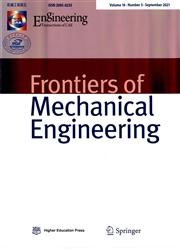纳米流体中流速和CNM浓度对对流传热系数性能的影响
IF 4
2区 工程技术
Q1 ENGINEERING, MECHANICAL
引用次数: 0
摘要
本研究的目的是研究水基碳纳米材料(CNM)纳米流体的热性能,特别是对流换热系数(h)参数,并分析纳米颗粒浓度和流速对实验换热系统的影响。为了实现这一目标,研究人员通过两步法制备了纳米流体。在第一步中,我们使用磁力搅拌器将纳米颗粒与基础液混合以确保均匀,cnm -水的比例分别设置为30、75、120和150 ppm。在第二步中,我们对制备的样品进行了表征,通过PSA和SEM-EDX检测确定了它们的大小、组成和颗粒形态,并测量了它们的密度(ρ)和比热(Cp)。实验采用带数据采集系统的流量模拟试验台,在0.2、0.6、1、1.4 L/min的不同流量下进行。在入口、出口和加热器处测量温度(T),以确定对流换热系数值。本研究成功考察了CNM浓度和流量的直接影响,与以往研究相比,该系数的结果与预期值一致。当CNM-Water比为150 ppm,流速为1.4 L/min时,系数值最高,为1825.37 W/(m2.K)。本文章由计算机程序翻译,如有差异,请以英文原文为准。
Effect of flow rate and CNM concentration in nanofluid on the performance of convective heat transfer coefficient
The aim of this study is to investigate the thermal performance of water-based Carbon Nano Material (CNM) nanofluids, particularly in the convective heat transfer coefficient (h) parameter, and to analyze the effects of nanoparticle concentration and flow rate on an experimental heat transfer system. To achieve this, the researchers prepared the nanofluid through a 2-step method. In the first step, we mixed the nanoparticles with the base fluid using a magnetic stirrer to ensure homogenization, with the CNM-Water ratio set at 30, 75, 120, and 150 ppm. In the second step, we characterized the prepared samples, determining their size, composition, and particle morphology through PSA and SEM-EDX examination, as well as measuring their density (ρ) and specific heat (Cp). The experiments were carried out using a flow rate simulation test rig with a data acquisition system, at different flow rates of 0.2, 0.6, 1, and 1.4 L/min. Temperature (T) was measured at the inlet, outlet, and heater to determine the convective heat transfer coefficient value. The study successfully investigated the direct impact of CNM concentration and flow rate, with the results showing a consistent and expected value of the coefficient compared to previous studies. The highest coefficient value was observed at 150 ppm CNM-Water ratio and a flow rate of 1.4 L/min, with a value of 1825.37 W/(m2.K).
求助全文
通过发布文献求助,成功后即可免费获取论文全文。
去求助
来源期刊

Frontiers of Mechanical Engineering
Engineering-Mechanical Engineering
CiteScore
7.20
自引率
6.70%
发文量
731
期刊介绍:
Frontiers of Mechanical Engineering is an international peer-reviewed academic journal sponsored by the Ministry of Education of China. The journal seeks to provide a forum for a broad blend of high-quality academic papers in order to promote rapid communication and exchange between researchers, scientists, and engineers in the field of mechanical engineering. The journal publishes original research articles, review articles and feature articles.
 求助内容:
求助内容: 应助结果提醒方式:
应助结果提醒方式:


